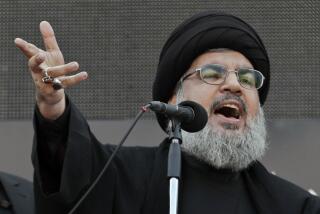Clearer Picture of Gunmen Reflects Creed of Violence
WASHINGTON — From police interrogations in two European capitals, a clearer picture began emerging Monday of the terrorists who murdered 14 travelers at the Rome and Vienna airports last week: They were young Palestinians recruited from refugee camps to a creed of violence, trained and equipped with Libyan help and flown into Europe weeks in advance to await their signal to kill.
The surviving suspects, two in Vienna and one in Rome, confessed to Austrian and Italian police that they are members of a Libyan-based Palestinian faction led by Abu Nidal, who was expelled from the Palestine Liberation Organization a decade ago for resisting curbs on terrorism.
“A lot of the details are still unclear,” a State Department official warned. “But one thing that is solid is the tie to Abu Nidal, and there is increasing evidence of a direct link to Libya.”
Austrian Interior Minister Karl Blecha told reporters that one of the surviving gunmen said he had worked at the headquarters of Abu Nidal’s military organization, called Al Assifa (the Storm). Blecha’s aides said the headquarters is in the Libyan capital, Tripoli.
At the same time, the government of Tunisia said Monday that the Tunisian passports carried by the terrorists in Vienna actually came from Libya--either lost by Tunisians visiting there or confiscated by Libyan authorities.
In an official statement Sunday, Libya hailed the airport massacres as “heroic.”
Officials in Rome and Vienna said they are seeking clues to the identity and whereabouts of several accomplices to the gunmen who apparently aided the attacks but were not captured on the scene.
Accounts from the three surviving gunmen indicated that at least some of them came from the Palestinian refugee camps of Lebanon, formed teams in Switzerland and arrived undetected in Austria and Italy in November and December, according to reports in Rome and Vienna.
In the twin attacks, launched almost simultaneously, four terrorists opened fire on the ticket counter of El Al Airlines at Rome’s international airport, and three gunmen attacked El Al’s counter at Vienna.
Twelve travelers, including five Americans, and three terrorists died in Rome, while two travelers and one terrorist were killed in Vienna, for a total of 18 deaths. More than 120 people were wounded.
Met by Geneva Contact
Reuters news agency reported from Rome that the surviving gunman there, who identified himself as Mohammed Sarham, 19, told investigators that he and an accomplice flew from Beirut to Geneva, where they were met by a local contact and given money and instructions.
Sarham and his companion, Mohammed Hussein, then traveled by train to Rome and stayed in cheap hotels waiting for two other guerrillas, whom they had never met, to arrive, Reuters said.
They met a local contact in Rome who gave them new Moroccan passports, Sarham reportedly said. Until then, Sarham had been using a Kuwaiti passport and Hussein a Saudi Arabian passport, Reuters reported.
Supplied With Weapons
Sarham said the contact supplied the group with weapons the day before the attack. That evening, the men took taxis to Leonardo da Vinci Airport to plan their action and then returned to their hotels.
Early the following morning, the four men, carrying submachine guns and grenades in cloth bags, took two taxis to the airport and burst into the terminal.
Italian Interior Minister Oscar Luigi Scalfero confirmed part of that account. “There can be no doubt that the terrorists were given help, and that help must have come from Rome,” he said.
According to the Italian news agency ANSA, police believe that two groups of four terrorists each left Geneva for Vienna and Rome on Nov. 27.
Doubt in Switzerland
In Bern, Roland Hauenstein, spokesman for the Office of the Federal Prosecutor, said Swiss authorities have no evidence indicating that the attacks were prepared in Switzerland.
On Sunday, Italian newspapers quoted the chief of Italy’s military intelligence agency as saying the terrorists had been trained in Iran and stopped in Syria on their way to Rome. But U.S. and Italian officials said Monday that there was no evidence to support that account.
In Vienna, Interior Minister Blecha said police have determined that the terrorists had traveled to Austria on Tunisian passports and stayed in cheap rooming houses for at least several days before the attack. Tunisians are the only Arab nationals who do not need visas to enter Austria.
The airport massacres may have been the bloodiest acts ever staged by Abu Nidal, a PLO renegade whose real name is Sabri Banna.
The most extremist of all Palestinian terrorists, Abu Nidal has publicly branded PLO chief Yasser Arafat a traitor for his willingness to negotiate with Israel and has targeted Palestinian moderates as often as Israeli civilians.
In 1974, he was condemned to death in absentia by a PLO “court-martial” shortly after he split with Arafat’s Fatah faction and formed a group called the Revolutionary Council of Fatah. At the time, Arafat was steering the PLO away from terrorism outside Israel; Abu Nidal objected to those restraints.
Terrorism is “very legitimate indeed,” he told the West German magazine Der Spiegel in an interview this fall.
Rare Press Encounters
That interview was one of only three known encounters between Abu Nidal and the press. The secretive terrorist has rarely even claimed responsibility for his attacks, unlike most such groups, which hunger for publicity.
So shadowy have his movements been that Abu Nidal was widely reported dead early this year--a report that persisted for several weeks until he gave an interview to refute it.
His organization is believed to have only a few hundred followers, no publicly known offices or addresses, and a careful system of isolating one cell from another so that the network is difficult for enemy intelligence services to penetrate.
Abu Nidal has claimed responsibility--or, more often, has been blamed--for attacks on hotels in Syria and Jordan, on Israeli and other Jewish officials in Europe and on a Saudi Arabian oil field in 1977. The attack in Saudi Arabia killed 12 people and caused $100 million in damage.
Tied to Several Murders
He is believed responsible for the murder of several moderate PLO figures who promoted negotiations with Israel.
Some PLO officials blamed the Abu Nidal organization for the hijacking of an Egyptian airliner to Malta last month. Sixty people were killed during the hijacking and a rescue attempt by Egyptian commandos.
Abu Nidal told Der Spiegel that he was born to well-off parents in 1937 in what was then Palestine, worked for the American-managed oil company Aramco in Saudi Arabia and joined Arafat’s Fatah organization in the 1960s.
He served as Arafat’s representative in Iraq for about five years before his split with the PLO. At various times since then, he is said to have had headquarters in Iraq, Syria and, most recently, Libya.
More to Read
Sign up for Essential California
The most important California stories and recommendations in your inbox every morning.
You may occasionally receive promotional content from the Los Angeles Times.











